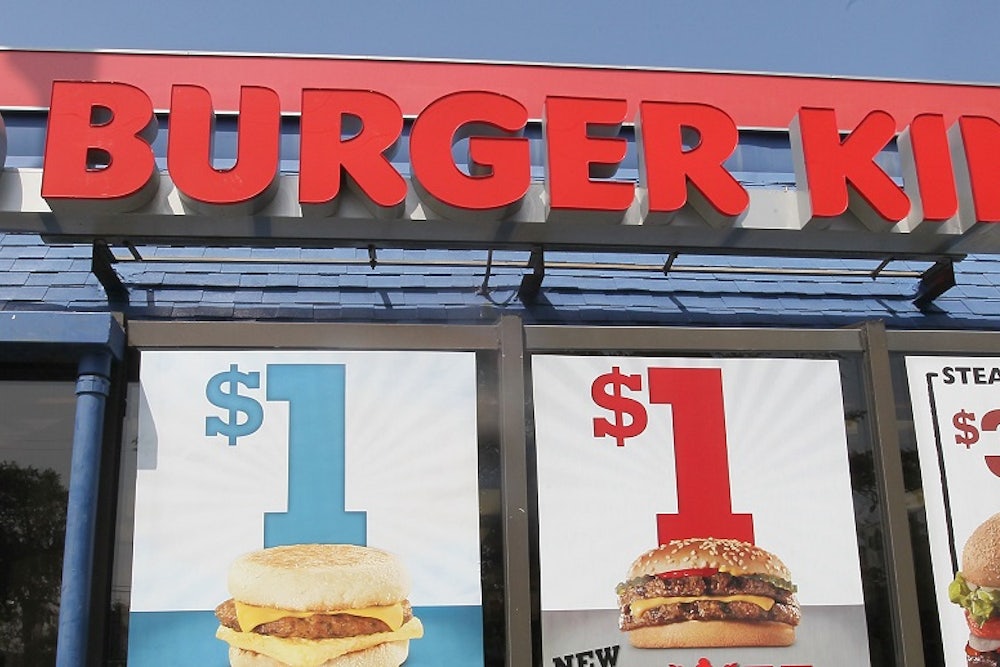Call it the Burger King backlash. On Sunday night, the Wall Street Journal reported that the fast food giant was looking to buy Tim Hortons, the Canadian coffee and donut chain, in the latest bid by an American firm to escape the U.S. corporate tax system. By Monday morning, the company was facing a public relations crisis.
On Morning Joe, hosts Joe Scarborough and Mika Brzezinski agreed that they would no longer eat at the company’s restaurants. “You know what I’m going to do so we can afford to pay Burger King's taxes?” Scarborough asked. “I’m just not going to ever go to Burger King.” Senator Sherrod Brown released a statement condemning the move. Burger King’s official Facebook page was flooded with comments calling the company a tax dodger and even a traitor. The message is clear: If Burger King goes through with the purchase, and uses it to avoid U.S. taxes, many Americans will boycott their restaurants.
This swift reaction is emblematic of a much larger disconnect in the ways big business and main street think about the responsibility of U.S. corporations. Company executives have a real fiduciary duty to shareholders to maximize profits. Leaving money on the table by not employing such strategies is, in theory, a breach of that duty. But, in the past, companies felt at least some obligation to do right by the American people, even if that meant forgoing some profits and hurting their shareholders. That mindset no longer exists. Now, American firms seek out every loophole, so they can squeeze out every dime of after-tax profits.
You can understand why Americans are so furious about it. Burger King is trying to use a “tax inversion”—a complex tax avoidance strategy in which an American firm changes its official tax jurisdiction to a foreign nation with a lower corporate rate. But nothing else changes since the majority of shareholders remain American, management and control operations stay here, and so on. As Steve Wahmoff, the legislative director at Citizens for Tax Justice, told me in May, “It’s still the same American company, it just gobbled up some smaller company.”
Plenty of companies have done this before. Health and pharmaceutical companies are among the most well-known, and in many cases legislators decried those moves. But the reaction was limited and, ultimately, not that consequential. Why has Burger King fared differently? Because it is an iconic American brand that is widely known and sells directly to consumers. In July, another well-known, consumer-facing company tried to use an inversion to reduce its tax bill. That firm was Walgreens, but its officials quickly withdrew their plan after facing a massive negative response from the American public.
Burger King undoubtedly knew that it, like Walgreens, would be criticized for using an inversion. Maybe they deemed the negative PR a worthwhile cost for lowering their tax bill. Maybe they underestimated the magnitude of the negative response. In the upcoming months, we’ll see if Burger King follows Walgreens path and announces that it will not use the tax loophole.
However, the negative reaction also creates problems for the Republican Party. After all, Republicans are the ones blocking Democratic legislation in the House and Senate that could put a stop to tax inversions. The more iconic American firms that look to move overseas, the more pressure Congress will face to block the practice—and the more foolish Republicans will look protecting businesses that want to ditch the U.S. corporate tax code.
—Danny Vinik
News from Monday:
BEST COLLEGES: The Washington Monthly has published its annual list of the nation’s best colleges, based not just on reputation and selectivity (like most rankings) but also on affordability, diversity, and other metrics. That’s why, for example, fourteen of its top twenty are public rather than private. You can read all about it here.
FERGUSON: Emily Wax-Thibodeaux reports from Michael Brown’s old, impoverished high school where kids significant road blocks to success. “If education is the gateway to a better future,” Wax-Thibodeaux writes, “the door here was shut long ago, fueling a mix of resignation and rage.” (Washington Post)
EDUCATION: Low-income Americans still make up a small percentage of the students at the country’s top colleges, despite commitments by schools to admit more of them. (Richard Pérez-Peña, New York Times)
ECONOMY: Amazon purchased Twitch, the popular online channel that shows people playing video games, for nearly $1 billion. (Douglas MacMillan and Greg Bensinger, Wall Street Journal)
VETERANS: Obama will announce today new executive actions that will make it easier for veterans to receive mental health care and to lower their monthly housing payments. (Peter Baker, New York Times)
Things to read:
Hobby Lobby isn’t the only problem. Michelle Andrews reports that some insurers are trying to avoid covering all medically approved forms of birth control, even though Obamacare requires it. (Kaiser Health News)
Department of chutzpah: New Hampshire Senate candidate Scott Brown, the Republican who says he opposes Obamacare, is touting his support for the 2006 Massachusetts law that was Obamacare’s prototype. (Jed Lewison, DailyKos, and Steve Benen, MSNBC)
Paul Ryan’s identity crisis: The only constant in the House Budget Chairman’s reading list is the presence of lunatic authors. Jonathan Chait explains. (New York)
Stories we’ll be watching:
Ferguson.
At QED:
Naomi Shavin explains that the government has no idea how often police use force against civilians. And Rebecca Leber finds yet another study that disproves the myth that global warming is on a hiatus.
